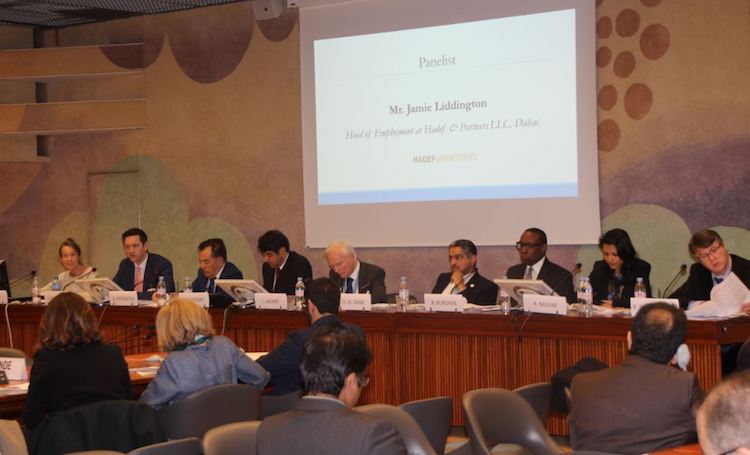By Jaya Ramachandran
GENEVA (IDN) – Labour law experts have praised the United Arab Emirates (UAE) for launching an initiative to facilitate access to justice for foreign workers, and expressed the hope that this initiative would be replicated by the other five Gulf Cooperation Council (GCC) countries: Saudi Arabia, Kuwait, Qatar, Bahrain, and Oman.
In doing so, they would be helping achieve Goal 16.3 of the Agenda for Sustainable Development endorsed by the international community in September 2015.
The labour experts participated in a panel debate held at the United Nations Office at Geneva. The conference, entitled ‘Improving access to justice for workers: the case of UAE’, was held on March 20 by the Geneva Centre for Human Rights Advancement and Global Dialogue (Geneva Centre) and the European Public Law Organization, in cooperation with the Permanent Mission of the UAE to the UN in Geneva. The debate took place on the margins of the 37th regular session of the UN Human Rights Council.
The UAE government’s policy to enhance access to justice is embedded in the UAE Vision 2021, which stipulates the importance of promoting safe, public and fair judiciary.
The implementation of the UAE Vision 2021 is bringing concrete results, according to the Geneva Centre’s Chairman Dr. Hanif Hassan Ali Al Qassim, in the field of enhancing judicial system access and efficiency. The introduction of e-trials, video conferencing, conciliation, real-time translations, mediation and court hearings are likewise telling examples of UAE’s aspirations to enhance access to justice.
In his opening remarks, the Permanent Representative of the Permanent Mission of the UAE to UN Geneva – Ambassador Obaid Salem Saeed Al Zaabi – observed that the UAE is “governed by a legal system that protects their beliefs, respects their customs and traditions and their way of life.”
“Multiple measures, decrees, and resolutions” will be considered by the UAE government so as to “implement these laws and increase workers protections.” Other initiatives related to the protection against work-related injuries, health, and insurance.
One concrete example of the UAE’s endeavours to enhance access to justice is the introduction of the Wages Protection System (WPS). This is an “important step to ensure the protection of the rights of workers,” Ambassador Al Zaabi said.
Dr. Jill Wells, Senior Policy Advisor at Engineers against Poverty, highlighted that the introduction of the WPS has contributed to resolving issues related to late payments of wages. Subsequently, companies employing migrant workers need to set aside bank guarantees to pay workers’ wages when employers default.
A case study analysis of the endeavours of the Abu Dhabi Judicial Department (ADJD) to promote access to justice was likewise offered by Benjimin George Burgher, Judge and Legal Consultant with ADJD. He pointed out that a mobile court is being used by ADJD to carry out “court procedures in an accessible and effective manner.” More than 70,000 workers have so far benefited from this innovative approach.
In view of the fact that migrants and foreign workers may add up to 90 percent of the populations in GCC countries, the Geneva Centre’s Executive Director Ambassador Idriss Jazairy – who also served as a moderator for the debate – underlined that labour reforms must benefit host and source societies alike.
A “consensus around the adoption of policies and measures aimed at enhancing the legal empowerment of foreign labour” is therefore a key priority. Labour reforms must also recognise the interplay between human rights and labour rights. Access to justice is not only about guaranteeing access to courts and legal representation, he said, but also about “seeking and obtaining a remedy for grievances.”
Ryszard Cholewinski, Senior Migration Specialist at the International Labour Organization (ILO) Regional Office for Arab States in Beirut, underlined that ILO remains committed to support the UAE government to address issues of relevance to access to justice.
“The UAE faces several challenges in the governance of its labour marker,” he noted as “low employment rate of nationals, a segmented labour market and deficits in the availability of reliable and comprehensive labour market data” remain the key challenges, according to Cholewinski. The protection of migrant workers should also be addressed as part of consultation phases of the Global Compact on Migration and for Refugees.
Abuse and harsh working conditions involving working conditions for domestic workers likewise remain issues of concern in the UAE, according to Rothna Begum the Women’s Rights Researcher on the Middle East and North Africa at Human Rights Watch.
Labour law related to domestic workers is weaker than the UAE labour law for all other workers. The UAE should therefore seek to ensure its law is aligned with the ILO’s Domestic Workers Convention “which maintains that domestic workers should have protections equivalent to those of other workers,” she said. The decision to establish a prosecution unit in Abu Dhabi focused on crimes against domestic workers, Begum said, was an important step that “could help increase investigations into abuses of domestic workers.”
The Permanent Representative of India to UN Geneva, Ambassador Rajiv Kumar Chander, added that enhanced access to information regarding the rights and responsibilities of foreign workers would contribute to addressing vital issues. He indicated that on a recent visit to the UAE, the Prime Minister of India had paid tribute to the Emirati policy towards Indian workers in the country. [IDN-InDepthNews – 22 March 2018]
Photo: Panellists discussing UAE initiative to enhance access to justice for foreign workers. Credit: Geneva Centre.
IDN is flagship agency of the International Press Syndicate.
facebook.com/IDN.GoingDeeper – twitter.com/InDepthNews

